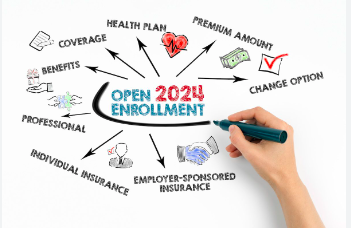Healthcare
The Importance of Health Insurance Open Enrollment

The Importance of Health Insurance Open Enrollment
Health insurance open enrollment is a crucial period for individuals and families to review, update, or enroll in health insurance plans. It is a time when individuals can make important decisions regarding their healthcare coverage for the upcoming year. Understanding the significance of health insurance open enrollment is essential for everyone’s well-being and financial security.
Ensuring Adequate Coverage
One of the primary reasons why health insurance open enrollment is significant is because it allows individuals to ensure they have adequate coverage. Life circumstances can change throughout the year, and it is essential to have a health insurance plan that meets one’s current needs.
Whether it’s a change in employment, family status, or healthcare requirements, open enrollment provides an opportunity to reassess and make necessary adjustments.
Access to Affordable Healthcare
Health insurance open enrollment also plays a vital role in providing access to affordable healthcare. During this period, individuals can compare different plans and choose the one that offers the best coverage at the most reasonable cost.
By exploring various options, individuals can find plans that fit their budget while still providing comprehensive healthcare benefits.
Preventing Coverage Gaps
Another essential aspect of health insurance open enrollment is the prevention of coverage gaps. Without proper coverage, individuals may face significant financial burdens in the event of unexpected medical expenses.
Open enrollment ensures that there are no lapses in coverage, offering peace of mind and protection against unforeseen healthcare costs.
Understanding Plan Changes
Health insurance plans can undergo changes from year to year. Premiums, deductibles, and coverage may be modified, and new benefits may be added.
During open enrollment, individuals have the opportunity to review these changes and understand how they may impact their healthcare costs and coverage.
Being aware of plan changes allows individuals to make informed decisions and select the most suitable option.
Utilizing Preventive Services
Many health insurance plans offer preventive services at no additional cost. These services can include vaccinations, screenings, and wellness visits. Open enrollment is an ideal time for individuals to evaluate their current plan and ensure it provides adequate coverage for preventive services.
By taking advantage of these services, individuals can prioritize their health and potentially prevent more serious health issues in the future.
FAQs
1. When is health insurance open enrollment?
insurance open enrollment typically occurs during a specific period, usually towards the end of the year. The exact dates may vary depending on the country and the specific insurance provider. It is important to stay informed about the open enrollment period to ensure timely action.
2. Can I change my health insurance plan outside of open enrollment?
In most cases, individuals can only make changes to their health insurance plan during the designated open enrollment period. However, certain life events, such as marriage, birth/adoption of a child, or loss of other coverage, may qualify for a special enrollment period. It is important to check with your insurance provider to determine if you are eligible for a special enrollment period.
3. Are all health insurance plans the same?
No, health insurance plans can vary in terms of coverage, cost, and network of healthcare providers. It is crucial to carefully review and compare different plans to find the one that best meets your specific needs and budget.
4. What happens if I miss the open enrollment period?
If you miss the open enrollment period, you may have to wait until the next enrollment period to make changes or enroll in a new health insurance plan.
However, certain qualifying life events may allow you to qualify for a special enrollment period outside of the designated open enrollment period.
5. Can I enroll in health insurance through my employer?
Many employers offer health insurance plans to their employees. Open enrollment for employer-sponsored plans typically occurs once a year, and employees have the opportunity to select the plan that best suits their needs.
6. How can I find affordable health insurance?
To find affordable health insurance, it is advisable to compare different plans and consider factors such as premiums, deductibles, and coverage. Utilizing online resources and consulting with insurance professionals can help individuals find the most cost-effective options.
7. What if I have a pre-existing condition?
Under the Affordable Care Act, health insurance plans cannot deny coverage or charge higher premiums based on pre-existing conditions.
During open enrollment, individuals with pre-existing conditions can explore different plans and select the one that provides the necessary coverage for their specific healthcare needs.
In conclusion,
Health insurance open enrollment is a critical period that allows individuals to ensure adequate coverage, access affordable healthcare, prevent coverage gaps, understand plan changes, and utilize preventive services.
By staying informed and taking advantage of open enrollment, individuals can make informed decisions that positively impact their health and financial well-being.
Healthcare
The Importance of Health Care Associated Infections: Impact on Patients and Healthcare Systems

The Importance of Health Care Associated Infections
Health care associated infections (HCAIs) are a significant concern in the medical field. These infections occur when patients acquire infections while receiving medical treatment or care. HCAIs can be caused by bacteria, viruses, fungi, or other pathogens, and they can lead to severe complications and even death if not properly managed. In this article, we will explore the impact of HCAIs on patients and healthcare systems, as well as the measures that can be taken to prevent and control these infections.
The Impact of HCAIs on Patients
HCAIs pose a serious threat to patients’ health and well-being. When patients acquire infections during their hospital stay or medical procedures, it can significantly prolong their recovery time and increase their risk of complications. These infections can also lead to increased healthcare costs, as patients may require additional treatments and interventions to manage the infection.
Furthermore, HCAIs can have a detrimental effect on patients’ quality of life. Patients who acquire infections may experience pain, discomfort, and emotional distress. They may also face challenges in returning to their normal daily activities and may require extended periods of rehabilitation and support.
The Impact of HCAIs on Healthcare Systems
In addition to the impact on patients, HCAIs also place a considerable burden on healthcare systems. These infections can lead to increased hospital stays, which can result in overcrowding and limited resources. The treatment of HCAIs requires additional healthcare personnel, equipment, and supplies, further straining healthcare facilities.
Moreover, HCAIs can contribute to the development of antimicrobial resistance. The overuse and misuse of antibiotics in the treatment of these infections can lead to the emergence of drug-resistant bacteria, making it more challenging to effectively treat infections in the future. This poses a significant public health concern and highlights the importance of implementing effective infection prevention and control measures.
Prevention and Control of HCAIs
Preventing and controlling HCAIs requires a comprehensive approach that involves healthcare professionals, patients, and the healthcare system as a whole. Here are some key strategies that can be implemented to reduce the risk of HCAIs:
1. Hand Hygiene
Proper hand hygiene is one of the most effective ways to prevent the spread of infections. Healthcare workers should wash their hands thoroughly with soap and water or use alcohol-based hand sanitizers before and after patient contact. Patients and visitors should also practice good hand hygiene to minimize the risk of transmission.
2. Infection Control Practices
Healthcare facilities should implement strict infection control practices, including the appropriate use of personal protective equipment (PPE), proper cleaning and disinfection of patient care areas, and adherence to standard precautions. These measures help prevent the transmission of pathogens and reduce the risk of HCAIs.
3. Antimicrobial Stewardship
Antimicrobial stewardship programs aim to promote the appropriate use of antibiotics to prevent the development of antimicrobial resistance. Healthcare professionals should prescribe antibiotics judiciously, considering the type of infection, the causative organism, and the patient’s individual circumstances. This helps prevent the emergence of drug-resistant bacteria and preserves the effectiveness of antibiotics.
4. Patient Education
Educating patients about HCAIs and the importance of infection prevention can empower them to take an active role in their own healthcare. Patients should be informed about hand hygiene, proper wound care, and the signs and symptoms of infection. By actively participating in their care, patients can help reduce the risk of HCAIs.
Conclusion
Health care associated infections are a significant concern that affects both patients and healthcare systems. The prevention and control of HCAIs require a collaborative effort from healthcare professionals, patients, and the healthcare system as a whole. By implementing effective infection prevention and control measures, such as hand hygiene, infection control practices, antimicrobial stewardship, and patient education, the risk of HCAIs can be minimized. It is crucial for healthcare facilities to prioritize the safety and well-being of patients by actively addressing the prevention and control of HCAIs.
Healthcare
Options for Obtaining Health Insurance Without a Job

The Importance of Health Insurance
Health insurance is an essential aspect of our lives, providing financial protection and access to quality healthcare services. Whether you are employed or currently without a job, having health insurance coverage is crucial for safeguarding your well-being and ensuring that you can receive the necessary medical care when needed.
Options for Obtaining Health Insurance Without a Job
While many individuals rely on employer-sponsored health insurance, there are alternative options available for those who are currently unemployed. It is important to explore these avenues to ensure that you have adequate coverage during this transitional period.
1. Medicaid
Medicaid is a government-funded program that provides health insurance to low-income individuals and families. Eligibility requirements vary by state, but generally, if your income falls below a certain threshold, you may qualify for Medicaid coverage. It is important to research and understand the specific guidelines in your state to determine if you are eligible for this program.
2. Affordable Care Act (ACA) Marketplace
The Affordable Care Act, also known as Obamacare, established a marketplace where individuals can purchase health insurance plans. These plans are designed to be affordable and offer comprehensive coverage. Depending on your income level, you may also be eligible for subsidies that can help reduce the cost of your monthly premiums.
3. COBRA Coverage
If you recently lost your job and had health insurance through your employer, you may be eligible for COBRA coverage. COBRA allows you to continue the same health insurance plan you had while employed, but you will be responsible for paying the full premium,
including the portion that was previously covered by your employer. While COBRA can be more expensive than other options, it provides continuity of coverage and allows you to maintain the same network of healthcare providers.
4. Spouse or Parent’s Health Insurance
If you are married or under the age of 26, you may be eligible to be covered under your spouse or parent’s health insurance plan. This can be a cost-effective option, especially if your spouse or parent has access to employer-sponsored coverage. However, it is important to carefully review the terms and conditions of the plan to ensure that it meets your healthcare needs.
5. Short-Term Health Insurance
Short-term health insurance plans are designed to provide temporary coverage during periods of transition, such as unemployment. These plans typically offer limited benefits and are not as comprehensive as traditional health insurance plans. However, they can provide some level of protection and peace of mind until you secure a more permanent solution
on.
Frequently Asked Questions
1. Can I apply for Medicaid if I am unemployed?
Yes, Medicaid is designed to provide health insurance coverage to low-income individuals and families, including those who are unemployed. Eligibility requirements vary by state, so it is important to research the guidelines in your specific state.
2. How can I determine if I qualify for subsidies through the ACA Marketplace?
The ACA Marketplace offers subsidies to individuals and families with income levels that fall within a certain range. You can use the online marketplace or consult with a healthcare navigator to determine if you qualify for subsidies based on your income.
3. What happens if I don’t have health insurance?
Without health insurance, you may be responsible for paying the full cost of medical services out of pocket. This can be financially burdensome and may limit your access to necessary healthcare. Additionally, without insurance, you may face penalties when filing your taxes, as the Affordable Care Act requires individuals to have health insurance or pay a fee.
4. Can I enroll in COBRA coverage if I quit my job?
If you voluntarily quit your job, you may still be eligible for COBRA coverage. However, it is important to note that you will be responsible for paying the full premium, including the portion that was previously covered by your employer.
5. Are short-term health insurance plans a good option?
Short-term health insurance plans can provide temporary coverage during periods of transition, such as unemployment. However, they typically offer limited benefits and are not as comprehensive as traditional health insurance plans. It is important to carefully evaluate the terms and conditions of the plan to determine if it meets your healthcare needs.
6. Can I be covered under my spouse or parent’s health insurance plan?
If you are married or under the age of 26, you may be eligible to be covered under your spouse or parent’s health insurance plan. This can be a cost-effective option, especially if your spouse or parent has access to employer-sponsored coverage. Review the terms and conditions of the plan to ensure it meets your healthcare needs.
7. How can I find more information about health insurance options?
For more information about health insurance options, you can visit the official websites of Medicaid, the ACA Marketplace, or consult with a licensed insurance agent. They can provide personalized guidance based on your specific situation and help you navigate the enrollment process.
Conclusion
While being without a job can be a challenging time, it is essential to prioritize your health and well-being. Exploring options for obtaining health insurance coverage, such as Medicaid, the ACA Marketplace, COBRA, spouse or parent’s insurance, or short-term plans, can help ensure that you have access to the medical care you need. Remember to carefully evaluate each option based on your circumstances and healthcare needs to make an informed decision.
Healthcare
The Importance of Health Insurance in Nigeria

The Importance of Health Insurance in Nigeria
Health insurance is a crucial aspect of financial planning and overall well-being. In Nigeria, having the right health insurance coverage is essential to ensure access to quality healthcare services and protect against unexpected medical expenses.
In this article, we will explore the different types of health insurance available in Nigeria and help you determine the best coverage for your needs.
Understanding the Nigerian Healthcare System
The Nigerian healthcare system consists of both public and private healthcare providers. While the public healthcare system is intended to provide affordable healthcare services to the general population, it often falls short in terms of quality and accessibility. Private healthcare facilities, on the other hand, offer higher quality services but at a higher cost.
Given the limitations of the public healthcare system, having health insurance becomes even more important. Health insurance provides financial protection and allows individuals to access private healthcare facilities without incurring significant out-of-pocket expenses.
Types of Health Insurance in Nigeria
There are several types of health insurance options available in Nigeria.
These include:
- Individual Health Insurance: This type of insurance covers an individual and their immediate family members. It provides coverage for medical expenses, hospitalization, and sometimes preventive care.
- Family Health Insurance: Family health insurance covers the entire family under a single policy. It offers similar coverage as individual health insurance but extends to all family members.
- Group Health Insurance: Group health insurance is typically offered by employers to their employees. It provides coverage for all employees and their dependents, offering a cost-effective solution for healthcare coverage.
- Government Health Insurance: The Nigerian government has implemented various health insurance schemes to provide affordable healthcare to its citizens. These include the National Health Insurance Scheme (NHIS) and the State Health Insurance Scheme (SHIS).
Choosing the Right Health Insurance
When selecting a health insurance plan, there are several factors to consider:
- Coverage: Assess the coverage provided by each plan, including hospitalization, medication, consultations, and specialized treatments.
- Network of Providers: Check if the insurance plan has a wide network of healthcare providers, ensuring you have access to quality healthcare facilities and specialists.
- Cost: Compare the premiums, deductibles, and co-payment requirements of different plans to find one that fits your budget.
- Additional Benefits: Some health insurance plans offer additional benefits such as maternity coverage, dental care, and wellness programs. Consider these extras when making your decision.
Frequently Asked Questions
1. Is health insurance mandatory in Nigeria?
No, health insurance is not mandatory in Nigeria. However, having health insurance is highly recommended to protect yourself and your family from unexpected medical expenses.
2. Can I use my health insurance anywhere in Nigeria?
Most health insurance plans have a network of healthcare providers where you can receive cashless treatment. It’s important to check the network of providers before choosing a plan to ensure you have access to quality healthcare facilities.
3. How do I file a claim with my health insurance provider?
To file a claim, you will need to submit the necessary documents, such as medical bills and receipts, to your health insurance provider. They will guide you through the process and reimburse you for the covered expenses.
4. Can I add my parents to my health insurance plan?
Yes, depending on the insurance provider, you may be able to add your parents as dependents to your health insurance plan. However, this may come with additional costs.
5. What happens if I don’t have health insurance?
If you don’t have health insurance, you will be responsible for paying for your medical expenses out of pocket. This can be financially burdensome, especially in the case of major illnesses or emergencies.
6. Can I switch health insurance plans?
Yes, you can switch health insurance plans. However, it’s important to carefully review the terms and conditions of the new plan and ensure it meets your healthcare needs.
7. How often should I review my health insurance coverage?
It is recommended to review your health insurance coverage annually or whenever there are significant changes in your healthcare needs or family structure. This will ensure you have the most suitable coverage for your current situation.
Conclusion
Health insurance is a vital component of financial planning and healthcare access in Nigeria. It provides individuals and families with the necessary financial protection and peace of mind when it comes to medical expenses. By understanding the different types of health insurance available and considering factors such as coverage, network of providers, and cost, you can make an informed decision and select the best health insurance plan for your needs.
-

 Trending Stories1 year ago
Trending Stories1 year agoCDC: 1 in 4 Americans Still COVID-Free by End of 2022
-

 Health5 years ago
Health5 years agoMeghan Trainor Shares Motivational New Song ‘Blink’
-

 Health2 years ago
Health2 years agoHow Long Does Monkey Pox Last Before It Surfaces in the Body?
-

 Health2 years ago
Health2 years agoWhat Causes Swollen Body? Understanding Edema and its Triggers
-

 Health3 years ago
Health3 years agoNutrition and the Importance of a Fitness Program – 3 Things to Know
-

 Health3 years ago
Health3 years ago5 Weird Reasons Why Pimples Disappear After Marriage
-

 Health3 months ago
Health3 months agoHow Do Pawpaw Seeds Support Cardiovascular Health?
-

 Health2 years ago
Health2 years agoHealth Benefits Of Pawpaw Seed? 7 Things To Know







